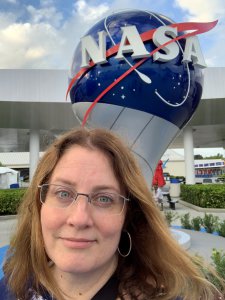Staph is commonly found in the nose and on skin, but after long durations in space, may be a risk factor for serious infection
Astronauts must remain healthy throughout space missions. But when the missions lengthen, more factors can make them sick including potentially harmful bacteria.

Kelly Rice, UF/IFAS microbiology and cell science associate professor, studies bacteria that cause human and livestock infections, namely staph infections. Her most recent research investigates how Staphylococcus aureus responds to the space environment and could impact astronaut health.
“Plans for future astronaut extended space flight missions, such as long-term missions on the lunar surface and the eventual multi-year mission to Mars, make it incredibly important for us to understand how the bacteria behave in these environments and ensure astronauts stay healthy,” said Rice. “This new grant allows us to build upon what we know from previous ground-based and space flight studies. Once we better understand how these bacteria act in space, we can develop better protocols and treatment measures for astronauts in space.”
S. aureus can be found in the nose or on other skin areas. About 20 to 30% of people are colonized with this bacterium at any given time. If someone suffers a minor cut or scrape, especially if they have a compromised immune system, S. aureus can take advantage, multiply and cause disease. Certain strains of this bacteria, called community-acquired S. aureus, can infect otherwise healthy people and spread easily among people – especially those in close quarters.
“We are focusing on a worst-case scenario with such a pathogenic bacterium as S. aureus, but the information gained from studying S. aureus may apply to other bacteria as well,” she said.
“Astronauts receive a series of medical checkups before and after space flight and research to improve and maintain their health in space is an ongoing effort,” Rice said. “It’s been shown previously that when astronauts have returned from certain flight missions, staphylococcal bacteria were more predominant than when they left. This could be due to the enclosed environment or alterations to S. aureus biology that occur in response to the space flight environment, making it easier for the bacteria to spread.”
Astronauts on the International Space Station (ISS) will grow samples of S. aureus, which will be compared for changes in gene expression, proteins, and metabolism compared to control samples grown on Earth. Researchers in the Rice lab will also conduct ground-based simulated microgravity studies of S. aureus biofilms at the Kennedy Space Center Microgravity Simulation Facility. These experiments will help determine how the space flight environment impacts the ability of S. aureus bacterial cells to communicate with each other, and coordinate expression of virulence genes.
“This research was done before with the same S. aureus strain flown to the ISS, and its gene expression was highly changed,” Rice said. “We want to know if we will see this again, and if interfering with the bacterium’s cell-to-cell communication changes its response to space flight.”
In space, environmental factors such as microgravity and radiation, can change how bacteria grow and respond to stress.
The research team will also generate a random mutant library of S. aureus and send those strains to the ISS to look for mutants that are less fit during space flight and therefore may have less virulence potential.
Research on this specific project should begin in the late spring of 2021 and takes place over three years. S. aureus can expect to make its journey to the ISS in mid-2022.
This project is one of several recent grants recently announced by the NASA Biological and Physical Sciences Division’s Space Biology Program that will advance our understanding of how living systems respond to life in space. Three of 18 announced grants were awarded to UF/IFAS faculty to further research that will support human space exploration.
 0
0
